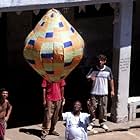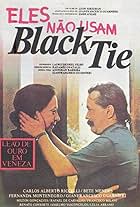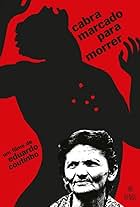For those who are wanting the essential background knowledge of Brazil's past turmoil, chances are one (like this reviewer) may find themselves unable to suffer fools gladly of Joaquim Pedro de Andrade's cinematic adaptation of Mário de Andrade's titular modernist novel.
Macunaima is the son of an indigenous woman who lives in the jungle with her two other sons, the white-skinned Maanape (Arena) and the dark-skinned Jigue (Gonçalves), and Macunaima, first played by the diminutive black actor Grande Otelo smack out of his mother's womb, is, according to the voiceover, "a hero without a character", and indeed we are instantly seized by the film's foolishly nihilistic, surreal style that is vigorously honed by its vibrant palette, zippy rhythm and wacky performance, especially by Otelo, who makes a helluva fun as a bawdy tot inconceivably maturing into an adolescent man, during a roll in the hay with Jigue's lover Sofará (Fomm), magic occurs, he becomes a handsome white man (José, who also plays the role of the brothers' mother). Pigmentation matters, even for the primordial libido.
The family's tapir-hunting good old days come to a halt when the mother dies abruptly (after Macunaima having a brush with a cannibalistic man), whereupon the brothers moves from the tribal land to Rio de Janeiro. Macunaima is captured by a feral guerrilla fighter Ci (Sfat), together they have a son (Otelo again), but bereavement soon catches up with him, and the desultory plot takes him up against a giant merchant Wenceslau Pietro Pietra (a funnily bulked up Filho), who inexplicably has the amulet from the deceased Ci, during which a cross-dressing Macunaima tries to seduce him only to no avail, and many a raunchy snippet punctuates the story with fitful energy and idiosyncrasy, some are hilarious but all shy of a sense of reverberation.
When the wrangle with Wenceslau reaches its improbable coda (a giant swing and a swimming pool full of dismembered bodies make unusual bedfellows to settle the dissension), Macunaima and his brothers returns to their sylvan turf, and this cradle-to-grave rhapsody ends with an inane splash that a connection towards this hammock-lying imbecile is rendered futile.
High on narcissism and male chauvinism, distaff parts are patly sexualized and depicted as erotomaniacs, Joaquim Pedro de Andrade's MACUNAIMA dates quickly in its ideology and mores, but on a lesser note, its visual grotesquerie makes it a curio worth visiting, better, if one can comb through its social analogy which is by default missing from this reviewer's limited perspective.





























